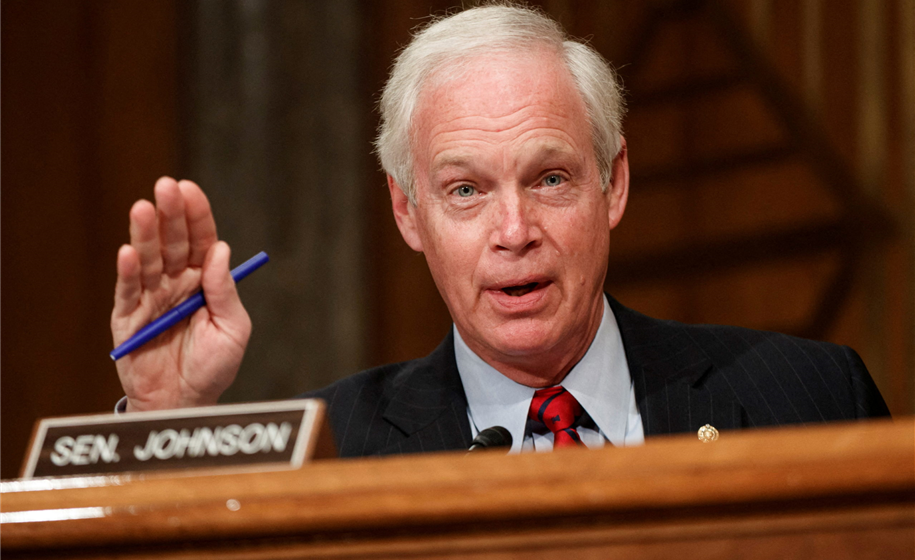Clear-eyed coverage of the Republican party’s radicalization “never lasts,” according to Thomas Zimmer, historian and visiting professor at Georgetown University. Rather, he took to Twitter to explain, journalists are publishing consistent uncritical coverage of extreme GOP perspectives, in service of an imaged ideal of “balance.”
After the May 24 mass shooting of a Uvalde, Texas, elementary school that killed 19 students and two teachers, Senator Ron Johnson said he opposed gun laws and blamed critical race theory and “wokeness” for school shootings. Coverage on Madison.com quoted him saying “This is a society-wide problem, a society-wide sickness that is not going to be solved by some gun law, additional gun laws here in Washington, D.C.”
Thomas Zimmer responded on twitter to Johnson’s remarks, saying “This perfectly captures the state of political discourse on the Right.” He argued that it’s irresponsible of established media to “keep pretending theses are serious people” in an attempt to “uphold the myth” that the U.S. has two equivalent parties.
Zimmer elaborated,
“Since mainstream journalism is predicated on the idea that politics is a game between two teams that are essentially the same and journalists aspire to “neutrality,” which they define as equidistance from either side, whatever comes from the GOP has to be elevated to credibility.”
Since mainstream journalism is predicated on the idea that politics is a game between two teams that are essentially the same and journalists aspire to “neutrality,” which they define as equidistance from either side, whatever comes from the GOP has to be elevated to credibility.
— Thomas Zimmer (@tzimmer_history) May 28, 2022
Therefore, Zimmer said, mainstream media clearly articulating what the Republican party has become would run counter to its quest for “nonpartisanship.” The GOP is covered as if it were a normal party, with the “‘both sides’ charade” only breaking for occasional horrific events.
“Uvalde was such an event,” Zimmer said. “And so we’re getting editorials telling us clearly what the problem is: The radicalization of the Right.”
But regardless, Republicans will receive their “normal” treatment again soon; they can “thoroughly debase” themselves on gun violence and still be taken seriously on taxes and welfare. Zimmer said journalists, acting oblivious to who they’re interviewing, “will keep approaching them with a microphone to spout their vile nonsense into, as if they hadn’t proven a million times they weren’t serious people.”
Zimmer finds it a bizarre aspect of American politics that we pretend suggestions like Johnson’s come from serious political actors, rather than acknowledge that one party is uninterested in protecting American lives. In a healthy culture, “anyone trafficking such deranged nonsense would be shunned and ostracized.”
“In the U.S., that’s evidently not the case,” Zimmer said. “And until that changes, nothing changes.”
Addendum: In case anyone needed more evidence for the type of mainstream media complicity I am criticizing here, the NYT has this to offer.
This type of coverage is actively harmful and serves no journalistic purpose beyond upholding the “neutrality” dogma. It needs to stop. https://t.co/JL2iABgZMv
— Thomas Zimmer (@tzimmer_history) May 28, 2022
While Zimmer said that the normalization of Republican radicalism is usually most obvious in opinion pieces, he dissected a New York Times report that “does more harm.” In this case, characterizing the push for gun control laws as a “gridlock” privileges “those who simply sabotage over those who want solutions.”
The Times piece falls back on blaming Washington’s “disfunction” and American “polarization.” Zimmer said these issues stem from tried-and-true Republican strategies and a radicalizing Right. The piece also lists Republican talking points blaming school security and mental health for school shootings as if “someone offered a new, yet to be tested, maybe potentially risky but also kind of innovative approach that just hasn’t been fully vetted yet…” Zimmer asked, “Is that what Republicans have been doing?”
There’s a long bipartisan tradition of blaming “Washington,” of course. But actively sabotaging government and then selling the ensuing dysfunction as proof that government doesn’t work – that’s really been a Republican specialty for decades, with disastrous consequences.
— Thomas Zimmer (@tzimmer_history) May 31, 2022
The piece goes on to describe the conservative social policies that “emboldened Republican legislatures” have been passing, saying that this prompted Democratic-led states to “respond in kind.” Zimmer said this implies, in line with the “polarization” framework, that “both sides are engaged in an equally bad, ever-radicalizing, dangerously escalating project to force their radical views and policies onto America.”
To equate Texas’s efforts to enact legislation to limit bodily autonomy with California enforcing existing gun laws eschews relevant context in favor of “neutrality.” This dogma encourages narratives that blame “division,” without accurately assessing the problem.
The “neutrality” dogma and the overwhelming desire to signal “nonpartisanship” have journalists gravitate towards narratives and frameworks that blame “division,” “polarization,” lack of “unity” – while never adequately and precisely assessing the problem.
— Thomas Zimmer (@tzimmer_history) May 31, 2022
“The resulting coverage constantly privileges the radicalizing rightwing forces in American life,” Zimmer concluded. “The cumulative effect of this kind of journalism is disastrous. So many Americans remain oblivious to the threat of Republican radicalization — and this is a big reason why.”

